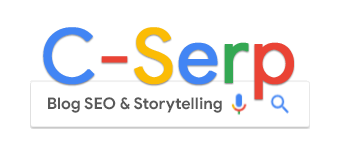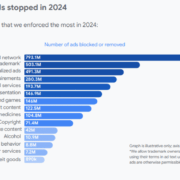Google: 39 million advertisers suspended; 5.5 billion ads removed in 2024

Google’s 2024 Ads Safety Report, released today, shows a massive uptick in how AI – particularly large language models (LLMs) – is helping the company block policy-violating ads before serving a single ad, thanks to earlier fraud detection at the account setup stage.
By the numbers. Google Ads last year:
- Removed 5.1 billion bad ads
- Restricted 9.1 billion ads
- Suspended 39.2 million advertiser accounts.
- Enforced against 1.3 billion publisher pages.
- Blocked or removed 415 million scam-related ads.
- Introduced 30+ policy updates across Ads and Publisher guidelines.



Search Engine Land’s Barry Schwartz has been following these stats for several years now and his analysis showed that account suspensions have gone up by over 200% YoY.

Why it matters. Online ads are big business — but they’re also a big target. As scammers get more sophisticated (and generative AI makes deception easier), platforms like Google are under pressure to defend users without slowing down legit advertisers. With a 200% YoY surge in account suspensions, it’s more important than ever for advertisers to understand and follow Google’s policies.
There may be an argument for using LLMs because they are smarter and faster. However, recent reports have cited lack of policy clarity when some suspensions have happened. This means there is an extra challenge of ensuring your ads are live once your campaigns are set up, and that Google still has a way to go in gaining advertisers’ confidence with their AI-powered approval process.
AI as ad bodyguard. Google’s AI upgrades in 2024 were both deep and wide:
- Google rolled out 50+ enhancements to its LLMs, allowing faster, more precise detection of red flags (e.g., fake payment info, shady impersonations) at scale.
- These tools now require less data to detect threats, making them faster at spotting evolving scam tactics.
- The company says AI models helped catch 97% of policy violations in publisher content, speeding up monetization for compliant sites while keeping ads off dangerous pages.
The impersonation crackdown. A major scam trend last year: ads using AI-generated images or voices to impersonate celebrities and public figures.
- In response, Google formed a 100+ person team to fight back, updating its Misrepresentation policy and rolling out new enforcement tools.
- The result: 700,000+ advertiser accounts were permanently suspended, and these scam reports dropped 90%.
A pivotal election year. With elections held in over 50 countries, Google expanded its political ad policies – including being the first platform to require labels on AI-generated content in election ads.
- In 2024, it removed 10.7 million election ads from unverified sources and verified 8,900+ new political advertisers.
The big picture. AI is reshaping both sides of the advertising coin – powering scams and stopping them. For Google, the path forward is doubling down on its tech advantage while collaborating with industry peers.
Dig deeper.


